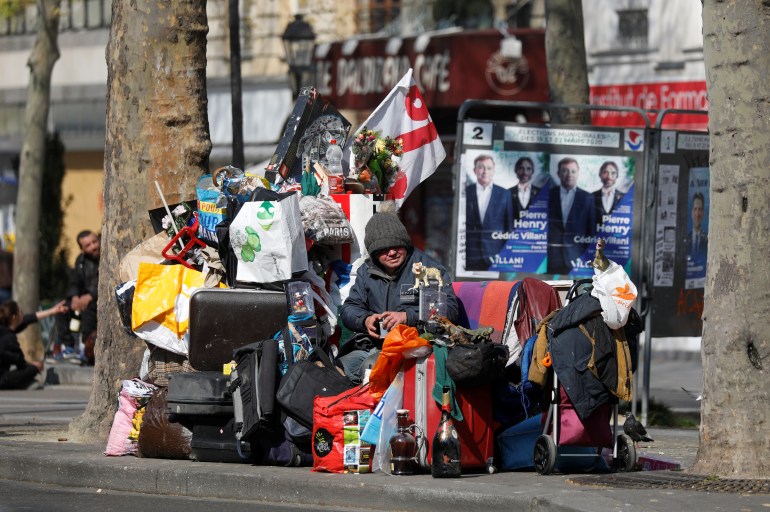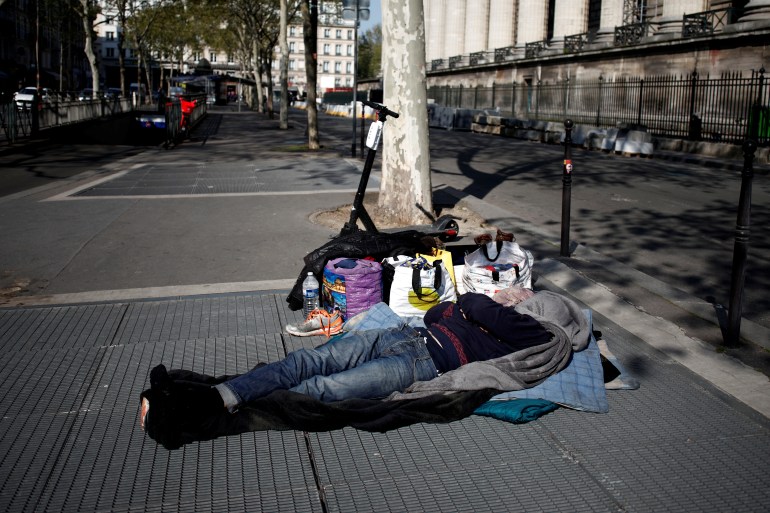Paris, France – “Spare some change, Monsieur” is heard in the busy streets of Paris an unsettling number of times. In the brief moments where coins or stares are exchanged, one can often see the worn-out looks of those far too familiar with the realities of street life and sleeping rough.
Others show no such signs. Had they not asked for money, it would have been easy to mistake them for tourists simply walking around with their suitcases.
Despite their different appearances, all of these people are tied by the same tragic fate: over the years, they have become the victims of France’s dramatic and ever-growing housing crisis.
It seems astonishing. On paper, Europe’s third largest economy has some of the world’s most comprehensive housing policies.
Shelter is a fundamental right, and French authorities have consistently passed laws to reinforce access to accommodation over the past 30 years.

Since 2007, there is even legislation providing an enforceable right to housing. Known as the “DALO law”, it requires the state to provide a home to any citizen or foreign resident in need.
Practice would say otherwise.
“DALO isn’t effective because politicians don’t play the game,” Fanny Plançon, project manager on emergency shelter and housing at Secours Catholique – an NGO, told Al Jazeera. “The law’s goal is to provide people in need with housing, but this doesn’t always happen.”
Tripled homeless population
The numbers speak for themselves. In its 2022 report, the Abbé Pierre foundation estimated France’s homeless population to be at least 300,000, thrice as many as in 2001.
Just before the coronavirus pandemic, the national statistics bureau (INSEE) found that 146 children had been born in the streets, four times more than in 2017.
Homelessness has many causes. Housing prices have skyrocketed, fuelled by speculation and by the challenges of regulating rental platforms such as Airbnb.
At the same time, French authorities have spent years cutting back on public housing spending, leading to chronic shortages across key cities.
“There are 10 candidates for every vacant social house in Île-de-France, many of which have priority under DALO,” said Farida Musayeva, an employee of the Action Logement – a company that builds public housing in cooperation with local governments.
“More than two million people are waiting for public housing, and this number keeps getting higher. Many people spend years on waiting lists,” she told Al Jazeera.
In a country where poverty is rising, many applicants cannot wait this long before ending up on the streets.
Macron’s promise
French President Emmanuel Macron promised change. Shortly after his 2017 election, the French leader said he no longer wanted “to have women and men in the streets, in the woods, or lost”.
A few months later, the government launched a five-year plan to fight and reduce homelessness.
Inspired by Finland’s hugely successful “housing first” policy, the goal was to allow those living on the streets to have rapid access to housing and social services.

However, while there have been some improvements to the plan, the Court of Accounts – France’s supreme audit institution – concluded that it has been largely ineffective.
The devil is in the details. While Finland’s “housing first” provides unconditional permanent housing, the French government has focused on offering more short-term emergency accommodation.
As such, many associations argue that authorities have accidentally – or deliberately – missed the point.
At the same time, the plan’s implementation has been uneven at best, often depending on the whim of local authorities and representatives of the state.
‘Absolutely scandalous’
“Macron should’ve kept his mouth shut,” said Anne Joubert, a leading member of the Génération.s party in the left-wing NUPES coalition.
“This is clearly not an issue for him, and there wasn’t a minister for housing under his first government. In the end, they created a Ministry of Territorial Cohesion, but this dossier was only mentioned in passing. Ever since coming into office, Macron’s decisions have actually been anti-housing,” she told Al Jazeera.
During the president’s first term, housing benefits were cut and construction dropped significantly. At the same time, many shanty towns were evicted without providing residents with alternative accommodation.
“We all know the solutions to this crisis,” said Joubert. Housing actors agree that building should be a top priority.
At the same time, many are pushing for rent control and for quotas to reduce the number of homes found on holiday platforms.
There is also consensus that evictions should be a last resort, reserved for extreme cases and for moments when alternative accommodation has been found.
Empty homes are also an issue.
“Paris has a lot of empty flats, and it’s absolutely scandalous!” said Joubert. “These apartments are often owned by foreigners who spend one or two weeks per year in the city. To give you an example, about 40 percent of homes at Île de la Cité are uninhabited.”
“The city has a tax for these cases, but the owners prefer paying than renting out their properties. Clearly, such practices need to stop,” she added.
Post a Comment